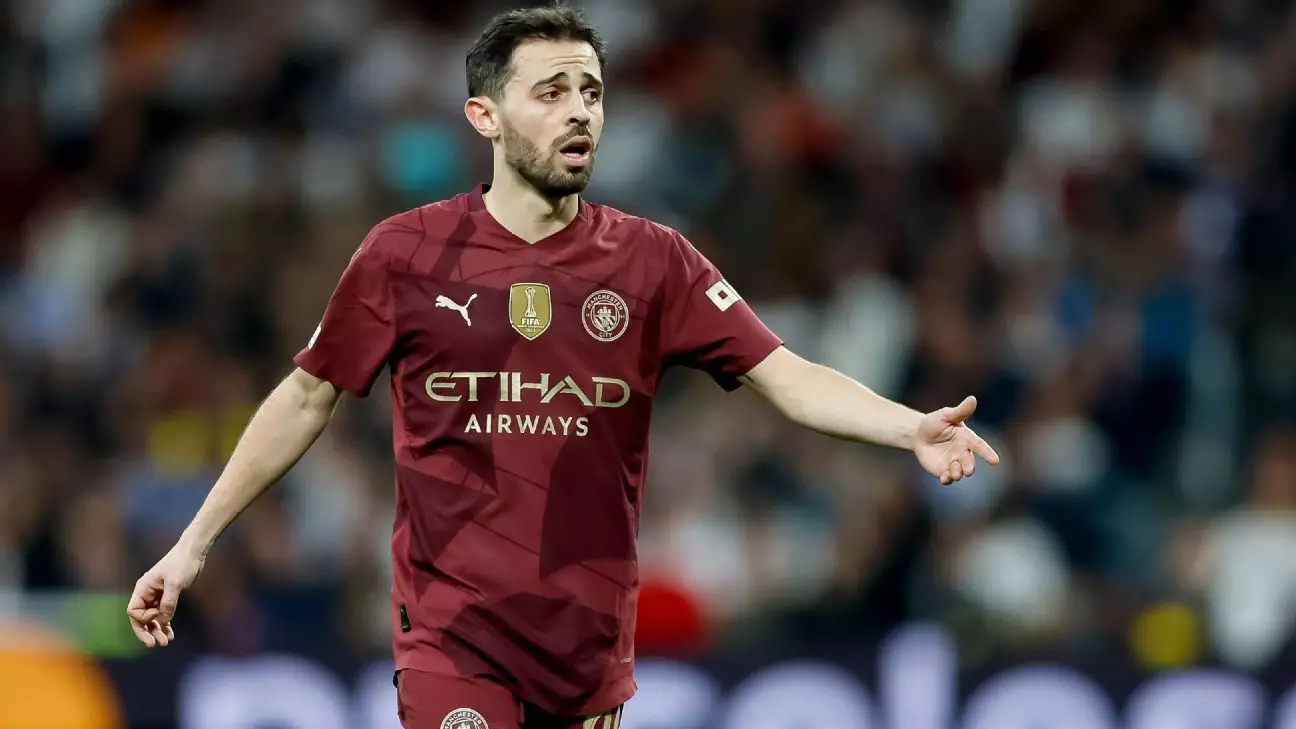Manchester City, once a juggernaut of English and European football, finds itself grappling with a season fraught with unexpected challenges and disappointments. Bernardo Silva, the club’s talented midfielder, recently voiced his frustrations following the team’s premature exit from the Champions League, marking a notable low in the club’s recent history. This disheartening chapter has not only affected Silva and his teammates physically, but has also seemingly permeated the team’s collective psyche, triggering a call for change as the season approaches its final chapters.
Silva’s sentiments reveal a candid acknowledgment of the harsh realities of football—a sport where expectations soar high and the consequences of underperformance hit hard. The midfielder has clearly articulated his feelings regarding the current campaign, opining that the culmination of lost opportunities has resulted in a deep sense of disappointment. Being eliminated from the Champions League at such an early stage raises questions about the team’s composition and strategy. Additionally, their position in the Premier League—seriously trailing behind the leaders—further compounds their troubles.
The frustration echoed by Silva is a reflection of not just individual ambitions but of the collective aspirations of a club accustomed to maintaining elite standards. The exit from the Champions League, especially after a compelling rivalry with Real Madrid, signifies more than just the loss of a match; it resonates as an emotional setback that reverberates throughout the club and its supporters. Silva’s assessment—that this season stands as his most challenging since joining City—reflects a broader narrative of instability that the club must confront.
Introduced to a competitive environment filled with high expectations, Silva has been a pivotal figure in Manchester City’s success story, clinching 17 major trophies since his arrival. However, the midfielder’s candid acknowledgment of the team’s lackluster performance this season forces fans and analysts alike to reflect on the underlying issues affecting the squad.
Injuries have undoubtedly played a significant role in the team’s struggles. The absence of key players, including Ballon d’Or winner Rodri due to a severe injury setback, highlights the physical toll that this campaign has taken on the team. Yet, Silva insists that injuries are not a blanket excuse for the downturn in performance. This perspective underscores a crucial point: mental resilience and team dynamics significantly influence success, perhaps even more than individual talent alone.
Silva’s comments on the “levels of calm and confidence” not being the same resonate deeply. The mental aspect of the game is often overlooked, yet it remains a critical factor in achieving peak performance. When a team faces successive defeats, doubts can creep in, impacting their collective mindset. Silva’s acknowledgment of this disconnect signals an acute awareness of the multifaceted nature of football, where each player must manage their individual challenges while contributing to the team’s overall morale.
Looking forward, Silva anticipates changes within the club as a necessary response to what he perceives as a disappointing season. His statement reflects a broader understanding within the football community: that transformation is often essential in the wake of failure. As a club celebrated for its progressive approach, Manchester City may need to undergo a reevaluation of its strategies and resources to regain its status at the pinnacle of the sport.
The quest for excellence is ongoing, and Silva’s confidence in the management, especially in Pep Guardiola, serves as a crucial beacon during these tumultuous times. It demonstrates the importance of trust and collaboration within the squad, even when external pressures mount. The cyclical nature of success and failure in football means that resilience, adaptability, and unity are indispensable in learning from adversity and charting a path forward.
The narrative presented by Bernardo Silva is not solely about the disappointments of the current season but also a poignant reminder of the inherent challenges of competing at the highest level. While Manchester City may be navigating a rough patch, the reflections of their players suggest a determination to learn and evolve. As the season concludes, the club’s focus must remain on not only rectifying past mistakes but also on forging a renewed identity that can reinvigorate the squad and its supporters alike. Through struggle comes the opportunity for growth, and Manchester City stands at a pivotal crossroads in its rich footballing history.

Leave a Reply